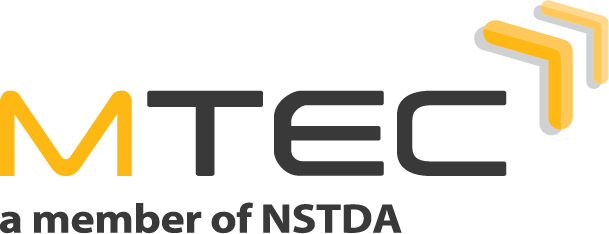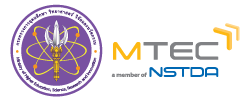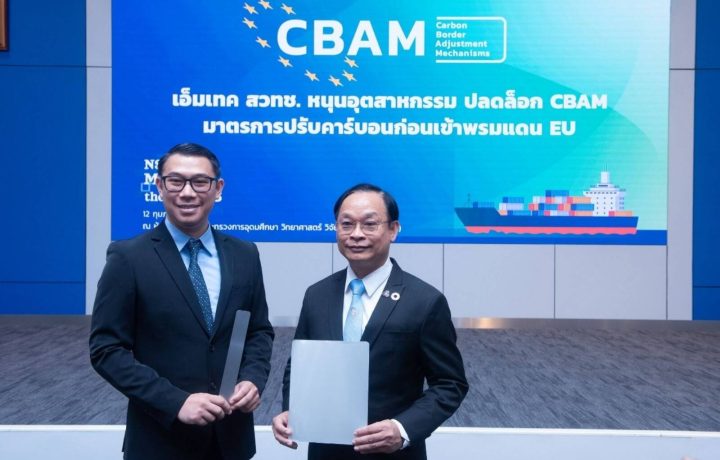
February 12, 2567, the Ministry’s Press Conference Room, 1st Floor, Rama VI Road
During the NSTDA Meets the Press event, Dr. Jitti Mungkalasiri, leader of the Life Cycle Inventory and Data Applications for Sustainability and Trade Research at the Technology and Informatics Institute for Sustainability (TIIS) of the National Metal and Material Technology Center (MTEC) under the National Science and Technology Development Agency (NSTDA), and Mr. Teerapun Pimtong, Honorary Chairman of Thai Aluminum Group and Chairman of the Board of the Federation of Thai Industries (FTI), participated in an exclusive interview. Their conversation centered on the implications of CBAM measures and preparedness for navigating carbon trade barriers before engaging with the European Union (EU).
“The European Union’s inaugural Carbon Border Adjustment Mechanism (CBAM) is set to levy tariffs on imported commodities with significant carbon footprints. Importers dealing in six specific product categories destined for the EU, encompassing cement, electricity, fertilizer, iron and steel, hydrogen, and aluminum, will be obligated to disclose direct and indirect carbon emissions from electricity consumption during manufacturing (Embedded Emissions). This mechanism is currently in transition and will be fully enforced by January 1, 2026, mandating importers of these six targeted product groups to procure CBAM Certificates commensurate with the volume of imports and the associated carbon emissions of these goods.”
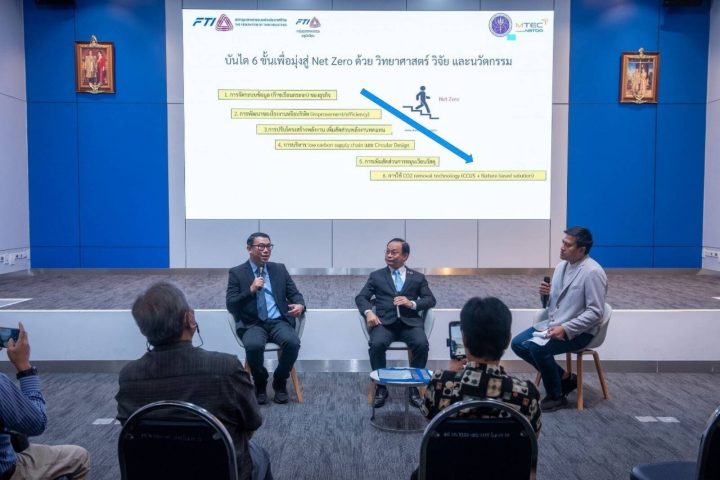
Mr. Teerapun Pimtong, Chairman of the Aluminum Industry Group within the Federation of Thai Industries (FTI), representing aluminum sector entrepreneurs, highlighted that the aluminum industry is one of the first six sectors to successfully establish environmental database frameworks in support of CBAM initiatives. This achievement was made possible through collaborative efforts with the National Metal and Materials Technology Center (MTEC), NSTDA, aimed at devising benchmarks for aluminum products under the CBAM framework. These benchmarks encompass input and output parameters for every sub-production process within the domestic casting, rolling, and sheet aluminum industries, facilitating precise monitoring of their respective input and output materials.”
“The key challenge for Thai industries is understanding the full extent of their carbon dioxide emissions under the EU’s CBAM framework. This emission data serves as a crucial point for comparison with European data, enabling further analysis to pinpoint areas for enhancement within each process. Such insights pave the way for bolstering production efficiency across the board.”
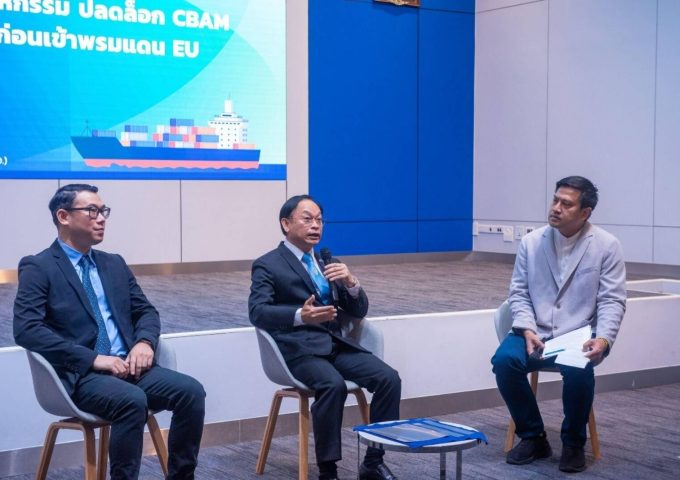
“Implementing CBAM measures within the aluminum industry is a critical issue. Once put into action, it will reveal areas requiring improvement. Our attention isn’t solely focused on the aluminum sector but extends to other supply chains, such as automotive, which rely on aluminum components. If CBAM can effectively target the source, it will benefit industries dependent on aluminum components. For example, there has been significant growth in the electric vehicle (EV) industry, particularly in aluminum-intensive components. Typically, EVs use around 70 kilograms of aluminum per vehicle, a figure expected to increase to 200-300 kilograms per vehicle, roughly tripling aluminum usage per vehicle.”
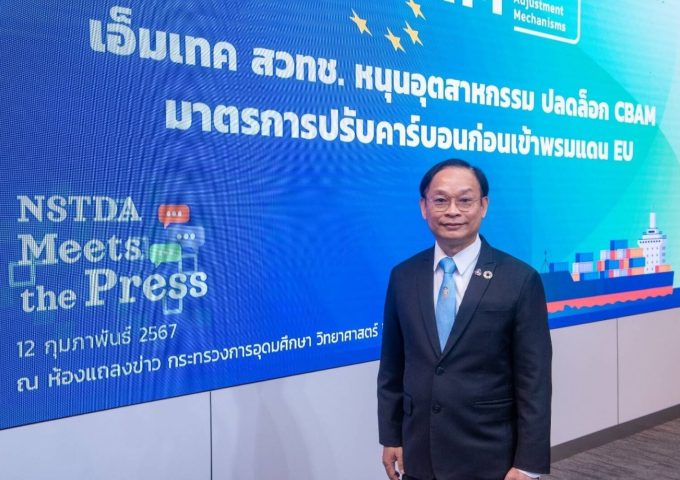
@The Aluminum industry is ready to accept CBAM, maintaining exports worth 4 billion baht – expecting to increase exports from unprepared competitors.
Mr. Teerapun Stated that the aluminum industry group’s swift adaptability is a distinct advantage. This agility is underpinned by robust support from the research team at the Sustainable Development Information Technology Institute (TIIS) within MTEC, NSTDA, providing crucial data and exploring avenues for production process enhancement. While many industries view CBAM with apprehension, perceiving it as a potential hurdle, the aluminum sector regards it as a strategic opportunity. Successfully negotiating of CBAM measures with the EU could grant Thailand a competitive advantage over other countries struggling to comply with the carbon cost reductions mandated by CBAM regulations. Countries failing to comply with CBAM regulations risk halting product exports. This presents a strategic opportunity for Thailand to increase its aluminum exports, surpassing previous levels.
“In 2023, Thailand exported about 20,000 tons of aluminum, with Europe accounting for 4-5%, or around 4 billion baht. Failure to comply with CBAM measures could mean an immediate loss of this 5% export value, totaling 4 billion baht. This estimation excludes other industries that are gradually falling under CBAM regulations.”

@ Propose rapid adaptation for six Thai industries eligible for CBAM measures.
The Chairman of the Aluminum Industry Group stressed the urgent need for all industry sectors to promptly assess their standards and accelerate efforts to continually enhance their understanding in dealing with CBAM measures, ensuring readiness for ongoing adaptation. While the aluminum industry group has made preparatory strides, they must synchronize with these measures. From 2024 to 2025, CBAM will impose no charges, but affected industries must prepare for evaluations. The European Union emphasizes the value of precise and timely data supported by reliable references. To achieve this objective, collaborative endeavors have been initiated with MTEC, the sole Thai organization equipped with data readiness. MTEC has laid down essential foundational data to aid various industries.
“Entrepreneurs facing urgent adaptation needs are advised to seek guidance from MTEC. Government support for these agencies with additional personnel and budget will empower expert research teams to consistently assist various industries. This proactive approach is set to positively impact Thailand’s export-driven economy. Anticipating CBAM charges, industries like oil refineries, glass manufacturing, and chemicals are expected to accelerate adaptation efforts over the next two years. CBAM measures present an unavoidable challenge for industries, highlighting the necessity for proactive adaptation.”
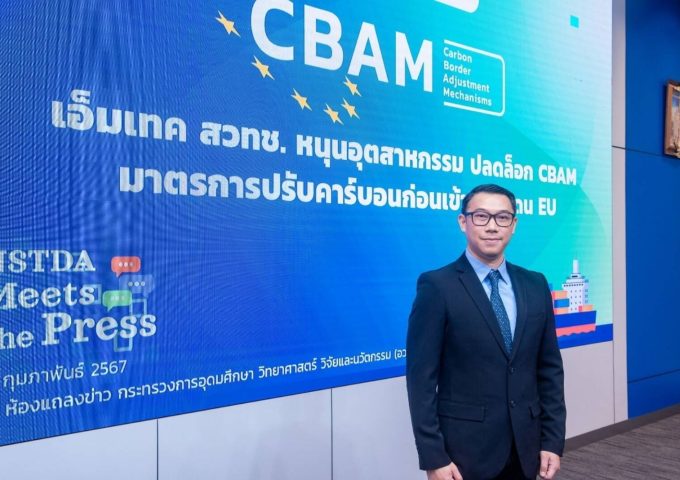
@MTEC NSTDA supports the industry by providing Thailand’s only carbon-neutral data source.
Dr. Jitti Mungkalasiri, head of the Life Cycle Inventory and Data Applications for Sustainability and Trade Research team under the Sustainable Development Information Technology Institute (TIIS) at the National Science and Technology Development Agency (NSTDA), stated that the Ministry of Higher Education, Science, Research, and Innovation (MHESI), through TIIS, NSTDA, has initiated the project “National Life Cycle Inventory (LCI) Database for Sustainable Development.” As a result, Thailand is among the leading countries in Asia to develop greenhouse gas emission data in line with CBAM principles, serving as a national benchmark to prepare for trade with the European Union. The aluminum industry group was the first to produce data during the transition period of CBAM measures. The evaluation results will provide the aluminum industry with the national CBAM benchmark to enhance trade negotiation and competitiveness.
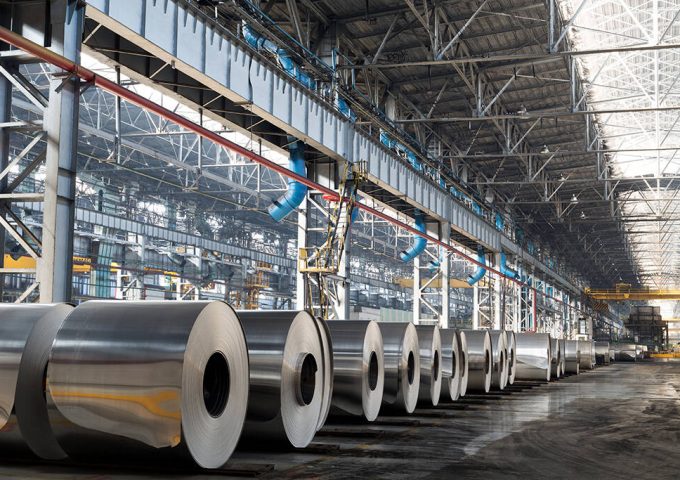
The CBAM measures are expected to increase the prices of goods and materials by 15%. For instance, purchasing aluminum ingots from various sources may have similar average prices, but the carbon value associated with aluminum varies from country to country. Hence, industries must adapt quickly to stay competitive against global rivals. Despite Thailand’s lack of primary aluminum smelters, relying solely on aluminum imports, the industry operates on a slim profit margin of 10%. Thailand’s economic sustenance hinges on its extensive production of hundreds of thousands of tons. However, potential declines in future profits attributed to CBAM measures could impact operators in the aluminum industry who directly export to the European Union.

“The successful outcome achieved by the aluminum industry group in adhering to CBAM measures at present is attributed to the provision of background data by the MTEC-NSTDA research team. This data encompasses various industries in Thailand, enabling entrepreneurs to access comprehensive information as the country’s benchmark. This data is utilized to comply with CBAM regulations set by the European Union. Over time, the research team has consulted aluminum industry operators on inputting data into the European Union’s system, ensuring compliance with carbon values of aluminum products exported from Thailand before they reach European Union borders.”
Mr. Teerapan emphasized the importance of entrepreneurs in the aluminum industry, considering examples of end products destined for Europe, such as thin and thick aluminum sheets. European manufacturers of air conditioning units import these sheets from Thailand. Therefore, Thai entrepreneurs must adhere to CBAM measures by conducting self-assessments and inputting data to determine the carbon emissions of exported aluminum materials. In the future, air conditioner manufacturers aiming to market their products in Europe and elsewhere must declare the quantity of aluminum they will utilize. This encompasses calculating the amount of aluminum from its source and whether these materials are aluminum or other consumer products like canned beverages or carbonated drinks, all under the purview of the CBAM measures. Consequently, entrepreneurs must prepare and analyze data to comply with carbon adjustment measures before crossing EU borders.

